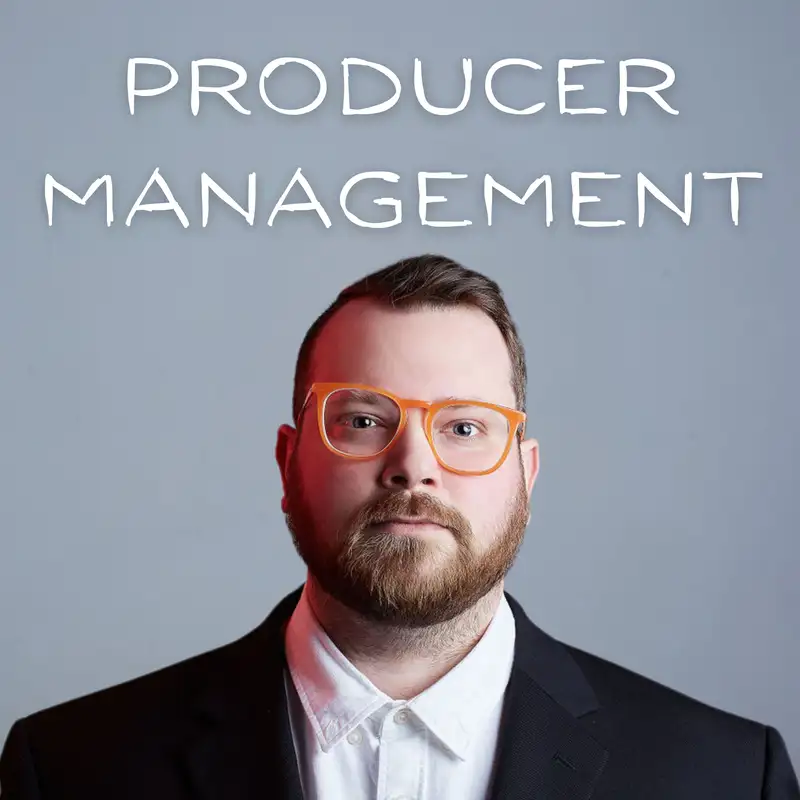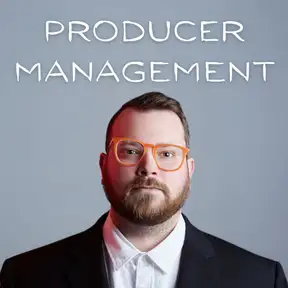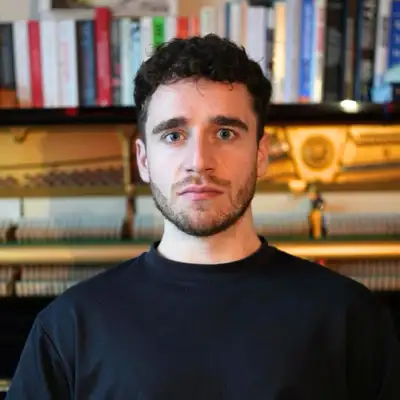
What No One Tells You About Remote Production
They're like, they're raring to go when we book it in, but then by the time we get there, it's like they're, they're busy that week or whatever, all of a sudden, then it starts two weeks after it was supposed to start. And like, that didn't need to happen. We had plenty of lead time, right? If you want an interesting idea, I had a couple of producers do this.
This was years ago, but... Hey everyone, Daniel Grimmett here. You're listening to Producer Management, the podcast that lets you in on real conversations between professional music producers and their teams, the deals, the strategies, and the unfiltered advice. This show is brought to you by my company, Dark Label Music.
When producers want clarity, strategy, and growth, they call us. We're hired as a strategic partner, part management, part creative and business development, designed for the realities of being a music producer right now. So whether you're a small studio or a Grammy-winning veteran, reach out to us at darklabelmusic.com to see if we can help.
In today's episode, I'm letting you in on a conversation between myself, my partner Aaron, and one of the producers that we're developing. This is an early stage, full-time producer in his 20s who's navigating the challenges of scaling his remote music production business. For context, he's earning between $3,000 to $5,000 a month, and YouTube is his primary client acquisition tool.
I think he's around 4,000 subscribers or something like that. He's working primarily with indie pop artists and singer-songwriters. This brainstorm session tackles three critical areas for growth, workflow efficiency, client expectation management, and payment structure.
We explore practical solutions for handling project delays, preventing scope creep, and structuring payments to protect your time and income. Remote production has some unique advantages, but also has some unique challenges. Whether you're just starting out with this or you're already established, you'll gain some actionable insights in this episode based on our experience working with hundreds of producers to do this.
Remember, there is no one-size-fits-all approach, so don't take any of this as gospel. The strategies we share are based on real-world experience, but you'll need to adapt them to your unique situation and clientele. This one's pretty straightforward, so I'm not going to add any additional commentary.
Here's the episode. Aaron, just to open up a discussion, this could potentially apply for anyone. I've been recently on an Alex Hormozy binge, as many of us, I'm sure, have been at some point or another.
One thing that he mentions is this idea that once the sale is made, there's this kind of instant gratification to curb buyer's remorse that can shape how the client feels about the money they just spent, so basically assuring them that, hey, this is good money spent. When I kept hearing that over and over again, I'm booking projects usually for a month or two in the future. They pay the deposit, and we have this timeline sorted out.
I don't really do anything to make them feel like that's money well spent until the project starts. I was just thinking if anybody has thought of this concept, this idea, in what we do specifically, and if there are any cool, interesting ways to implement that and just make the experience a bit more smooth throughout the whole process. I got some ideas.
I guess the first thing is when you're writing a book, you kind of got to include everything in the book, right, for people to know and give people ideas and things to think about. So I guess my first thing is if it's not a problem, then you don't have to fix what isn't broken. If you find that, wow, people are paying a deposit, but they've got to wait a couple months before the first session starts because you're booked up, and then they're falling off, then, okay, maybe there's a problem to fix.
If they're not, then there's not really a problem to fix here. However, if you want an interesting idea, I had a couple of producers do this. This was years ago, but they had their own little sort of portal for clients.
It helped on the before, right? Because they're cool. They start, they get put in this thing, they get to meet other artists that that producer's working with, connect with new people, see other releases coming out, get inspired. But then even after they were done working together, it was a way to kind of keep them in a bit of a nest.
That's a little bit more personal. You may have an email list or something too, but this is even more personal than that. It's an idea you could play around with.
Another thing as well, have you experienced a drop in rapport or bond with a client from when you kind of closed it to when you started? No, this is kind of more just preempting it, really. But I've had a few people, even when I'm very clear, like, hey, we're going to be starting on this day, which is, let's say, a month and a half in advance. In the meantime, I just had them be like, oh, hey, so when are we starting? I'm like, I told you already.
Just because I think there's just enough time that they get kind of like, you know, just they're raring to go, right? Sometimes. Like a series of prep that you could get them to do as part of your pre-production, that would then involve a level of engagement that would keep them as they're prepping for the process. Yeah, actually, that's good too.
Because another thing, one thing that has happened is I've had a project scheduled for, again, let's say a month in advance, just as a random number. And they're ready to go. They're like, they're raring to go when we book it in.
But then by the time we get there, it's like they're busy that week or whatever, all of a sudden. Then it starts two weeks after it was supposed to start. And like, that didn't need to happen.
We had plenty of lead time, right? So I do like that. Yeah, just in the meantime, because it's minimal work on my part, but it could get them just more ready to go when that start date actually does come around. Yeah, just kind of prepping them to like horse blinders, locking in at this point.
I don't know in what form it would take. The far and advancing is that, are they wanting to put the deposit down then start in advance? Or is it because of your schedule? Usually for my schedule. Yeah, your schedule.
And you're booked a month and a half out. It's been pretty consistently around one to two months. Yeah.
And remind me how many like projects do you have on the docker right now? Uh, like usually four or five. I'm starting like one a week. Right now, it might be a couple more because of ones that have dragged.
But four or five songs or projects with multiple songs, songs. Okay. Let's generally start to finish on a song.
I mean, I know you were dealing with some kind of slow folks when you first came in. Has that got any better? Or is it just communicating timelines a bit more clearly from the beginning has helped with that. But there's always going to be some that drag.
And I kind of just anticipate that now that there's going to be some artists who, you know, whatever, get some kind of a long instruction and then can't sing for two months or whatever it is, you know. Oh, I'm moving now. So like, yeah, I'm just accepted that.
Okay. All right. I'm just curious.
Keep, yeah, keep doing that. Well, I was going to say, do you think your biggest bottleneck is still artists delaying things or is there a bit to your process you could either refine or outsource if it's necessary or both? For sure, the artists delaying things has gotten a lot better. It could be even better than it is now, but it's improved a lot.
I very recently started working a lot more with like session musicians and stuff for basically for the instruments that I'm weaker at. That's been real. That's really, really good.
Yeah. It's been a super recent transition, but it's saving me a lot of time for sure. So I could see that helping a lot in the near future.
Yeah. How long does it take you to get start to finish on a record usually? Usually the range is around 20 to 30 hours. It can vary when I do like a really orchestral thing.
That's some of the projects I do. I've got one that's approaching about 55 hours right now, which is the longest by far I've spent in anything. But yeah, around there 20 to 30 usually.
I think I'm thinking the same thing as you Aaron. It seems like it's not enough work volume to where it would warrant month and a half wait list. Yeah, but yeah, but it could.
I mean, it's yeah, it's I'm gonna I'm basically gonna see in the next month. This year has been so weird because I was having all those tech problems in January and February that got me behind on everything. And then there's been there's been work from the past.
Basically, that's still like I spent 15 hours this last week on a project that I started last August because the artist finally got back to me. So there's been just weird anomalies like that. I could I'm I'm definitely as everything evens out, which it kind of is like right now.
I could I could be upping that to maybe, you know, one or two more songs per month kind of thing and then see how that sits. I know it's I know it's really tedious. But could you go and track the next three projects you do in Toggle and track time you're spending on vocals, drums, this part of production, that part of production, mixing and just gather a load of data because I feel like we could definitely make some bits more efficient if it's just the time.
And then also track holdups if it's then a day. Actually, it was a case of this week. Three people from four months ago finally gave me vocals that set me back.
And if that is becoming a pattern, maybe then it's just setting the expectation of saying, OK, great. You disappeared for three months. So based on current schedule, this will get back to you in next time.
Yeah, yeah, I kind of do that, but I should be better about that because I still when someone disappears for a month and comes back, I'm still like, OK, I'll get you this by like three days from now. And it's like, well, I have other things that I probably shouldn't be prioritizing because they're actually like when they're supposed to be happening. So, yeah, I could do that better for sure.
Do you feel a pressure when someone comes back and they expect it quickly? Kind of. I probably just said that on myself, though. Yeah.
We've talked too about splitting the projects up into multiple parts, too, where it's like you close it out technically after the track part is done. And then if they want to reopen or start part two of the project when they have vocals, it's you're treating it more as a new project instead of a continuation of the old project. So then that way, any time in between is not really hanging over your head.
Yeah, absolutely. I proposed that to someone that that one didn't close. I still have yet to actually organize a project like that, but I'm eager to try it.
So every first time artist who who comes to me now, I'm going to try proposing that probably to see how it goes. If he only does it once, it's hard to say. But you pitch the messaging slightly differently, isn't it? The deal is essentially the same, but it's a case of like.
Same deal, yeah. Yeah, the close. That's what I was thinking.
Maybe you could just do the deal and then just tell them after, like, cool, well, here's how, you know. Yeah, it's like time commitment, expectation is time coming up to here is my deliverables. Once I learn the stuff from you, time commitment commits again.
Once I give it to you and I give you the expected due date, just how you structure your projects. I mean, maybe having that just like really clear up front, then they know that if they do two months to give me both balls, there's a likelihood that you're going to take three weeks to get something back to them. Yeah, I could.
I could do that. It also, I think the first time I did it, and the guy, it wasn't that he didn't like the proposal. He was just like, I'm getting married later this year and my fiance doesn't want me to spend money right now.
So like, all right, fine. OK, I can do about that. But yeah, I think I felt like I was being accusatory when I was delivering that.
I was like you're. I feel like I was saying you're going to ghost me. And obviously, I didn't say that, but I guess in my head, it felt like that.
And that maybe that energy kind of came across or something to possibly. Go on James Connor, roleplay it. It's a good idea, actually.
And maybe just in your head, shift it more to like find expectations and just setting them up front, as opposed to it being like a very different deal structure or something or something they have to commit to. It's just like, this is how I work. Yeah, that's how I do it.
It's one big project where we split it into two because the middle part is, you know, your vocals. And some people like to take months. Some people like to do it in a day.
That's totally up to you. We just split it into two parts, you know? So you say, hey, ideally we move as fast as possible, but also understand different people do it different ways. So we kind of close out part one of the project.
Now the ball's in your court. I'll be here to assist if you need help finding a studio, whatever it is. And then when you bring vocals back to me, cool.
We open up part two of the project. Yeah. And you would structure the payment around that as well, right? Like there would be some kind of payment due at that point when like before starting final vocals.
Yeah, typically it happens in threes. Yeah, okay. Third down, third at the end of the track.
That way you're paid up for the work that you've done. Yeah, exactly. And then the final third at the mixing stage.
Yeah, cool. Yeah, I've mostly just done 50-50. So that would be slightly different, but it's easy to do.
And most people do a 50-50. But if you're running into this problem where people are either bailing when it gets to their part or take a long time, if they bail, then it's like or they take a long time, then it's like you haven't even been paid technically up for. You haven't been paid up for even the first part of your work of what you did.
This is especially important for you if you have, if you're hiring session musicians. Yes, yeah, absolutely. Yeah, it's gotten better, but you could also say like, hey, the first payment's due when we start.
And the second half is due when I deliver the track and then you go do your vocals and then you have a mix credit with me when you bring it back to mix. Do you think that, I guess you can only guess, but do you think that would have trouble converting? Do you think people would be a little bit wary about that? I've done all these before. Yeah, and did people have objections to that or no? No, most of the time people were fine with it.
I would just need to find out what they're skeptical about, I guess. Yeah. You know, if they're worried like they're not gonna, you know, they're gonna pay the rest of it and then not get the thing, then cool.
It's like, okay, well, what would make that better for you? And if they're like, well, I'd rather pay the half when it's all done, you know? It's like, well, in that case, would you be open to doing like the vocals on my timeline? I do it that way just so when you go do your vocals, since it's a remote, you can kind of take all the time you want, but I don't have this open project per se. But if you wanna do like an attended remote session where I know we're gonna get the vocals done on this day, then heck yeah, we can push right through it. Yeah, I think I just gotta get better at communicating that.
I will try that on a James call. It sounds like a good thing to do. If you go to producermanagement.com, you'll find links to jump on our newsletter, which I highly recommend because it's the perfect companion to the show.
And if you enjoy what we're doing here, please leave us a five star review or share it with a friend. Thanks for listening. That's the episode.


